Jurisdictions
Regions
Industry Sectors
10/08/22
IRELAND: Difficult to gauge cost of global corporation tax deal, says Tax Strategy Group.

As published on rte.ie, Wednesday 10 August, 2022.
It remains very difficult to accurately estimate the financial impact on Ireland's decision to join the global international corporation tax reform deal, the Tax Strategy Group (TSG) said today.
In a paper examining the issue of corporation tax, the group states that the current estimate of the cost is in the region of €2 billion annually.
It says there are still many details to be worked out in the complex international agreements, brokered by the Organisation for Economic Cooperation and Development (OECD).
These include sensitive issues for Ireland which are advancing but have not yet been finalised.
"The outcome of these discussions, coupled with the future business decisions of multinationals, will have significant implications for our future corporation tax receipts, and the scale of the effect will only become fully known with time," the group's report says.
In general terms though, the analysis states that Ireland will continue to be pro-active at both international and domestic levels to ensure the corporation tax regime remains competitive and continues to contribute to employment and economic growth, while also meeting the newly-agreed international tax standards.
"Our objective is to provide an attractive, stable and transparent CT regime, to provide certainty to businesses here and to allow us to continue to attract genuine substantive investment into the State," it says.
The group claims work on transposing the proposed EU Minimum Tax Directive that will ultimately give effect to the plan to implement a minimum corporation tax rate of 15% is underway and will continue to be ongoing over the 15 months before the Finance Bill 2023 is published.
The directive is to be implemented by 31 December 2023, in line with the OECD agreement, although the paper says it is not expected that the directive will be signed off by member states until later this year.
The paper also examines the issue of the concentration of 53% of all corporation tax receipts among the ten largest payers.
It says that increased concentration in recent years is "a matter of concern in considering longer-term sustainability" and will require ongoing careful monitoring.
But the TSG also finds that it could be expected that the concentration should moderate this year as Covid-19 related public health restrictions are eased and small and medium sized firms return to profitability.
The report also analyses the Section 481 tax relief available to film productions here and notes that the Department of Finance is currently undertaking a cost benefit analysis of it.
The relief is due to cease at the end of December 2024.
The group's report says that while the decision on whether to extend it or not is usually taken during the year it is due to cease, due to the long planning period needed for such productions the potential for a decision this or next year may be considered in order to provide certainty.
Last year the value of the relief was €98m, down from €113.8m a year earlier.
Animation accounted for 33% of the productions certified in 2019, up from 32% in 2020 and 29% in 2021.
The number of feature films certified fell sharply from 37 in 2019 to 18 in 2020 as a result of the impact of the Covid restrictions introduced in 2020, but increased again to 27 last year.
"This trend is also evident when analysing the total number of productions certified, with 120 certifications issued in 2019," it says.
"This decreased to 95 in 2020, before increasing to 112 in 2021, a figure comparable to the pre-pandemic levels of 2019," it addes
On the issue of the Research and Development tax credit, the report says as priorities return to normal following the pandemic, officials are looking at options to progress policy in the area.
These include options for other methods of support that take into account the significant changes to the wider economy since the measure was first announced.
The paper says the cost of the R&D tax credit has risen since its introduction in 2004 and, due to the project-based nature of R&D activities, there can be year-on-year fluctuations in the overall cost of the credit.
"The cost of the relief peaked in 2015, at €708m with 1,535 claims," it says.
"The latest cost figures for the credit are from 2020, where the cost was €658m with 1,616 claims. It is expected that the cost will increase again in future years," it adds.
The report also notes that the Knowledge Development Box is currently under review
It says the options for its future include extending it at the current effective 6.25% tax rate, extending it but increasing the effective tax rate to 9% or above, or allowing it to cease.
Regarding the new tax credit for digital games, the TSG says a number of minor technical amendments to the proposed legislation will be required in the Finance Bill to ensure it complies with EU state aid rules.



